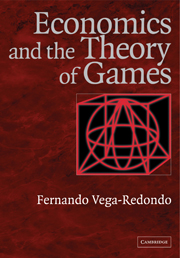Book contents
- Frontmatter
- Contents
- Preface
- 1 Theoretical framework
- 2 Strategic-form analysis: theory
- 3 Strategic-form analysis: applications
- 4 Refinements of Nash equilibrium: theory
- 5 Refinements of Nash equilibrium: applications
- 6 Incomplete information: theory
- 7 Incomplete information: applications
- 8 Repeated interaction: theory
- 9 Repeated interaction: applications
- 10 Evolution and rationality
- 11 Learning to play
- 12 Social learning and equilibrium selection
- Bibliography
- Index
11 - Learning to play
Published online by Cambridge University Press: 03 June 2010
- Frontmatter
- Contents
- Preface
- 1 Theoretical framework
- 2 Strategic-form analysis: theory
- 3 Strategic-form analysis: applications
- 4 Refinements of Nash equilibrium: theory
- 5 Refinements of Nash equilibrium: applications
- 6 Incomplete information: theory
- 7 Incomplete information: applications
- 8 Repeated interaction: theory
- 9 Repeated interaction: applications
- 10 Evolution and rationality
- 11 Learning to play
- 12 Social learning and equilibrium selection
- Bibliography
- Index
Summary
Introduction
Again, as in Chapter 10, the hypothesis of bounded rationality underlies most of the alternative models of learning studied here. We maintain, therefore, the methodological standpoint underlying evolutionary models; i.e., players cannot readily comprehend or tackle their complex environment. However, in contrast to the “reduced-form” approach displayed by the former evolutionary framework, the present one introduces two important novelties. First, there is an explicit description of how players attempt to learn over time about the game and the behavior of others (e.g., through reinforcement, imitation, belief updating, etc.). Second, the focus is on finite populations, where the interplay among the individual adjustments undertaken by the different players generates a learning dynamics significantly richer than in the continuum case.
Naturally, the different models to be considered in this chapter must be highly dependent on the specific bounds contemplated on players' sophistication (or “rationality”). Indeed, this very same idea helps us organize our discussion, with the alternative models studied being arranged along a hierarchical ladder of players' sophistication. Thus, as this ladder is ascended, players' learning is allowed to rely on a progressively more demanding level of “reasoning” about the underlying game.
We start by studying models of learning that approach matters at the lowest level of (bounded) rationality. These are the so-called reinforcement models where players are taken to behave quite primitively, simply reacting to positive or negative stimuli in a “Pavlovian-like manner.”
- Type
- Chapter
- Information
- Economics and the Theory of Games , pp. 398 - 445Publisher: Cambridge University PressPrint publication year: 2003



